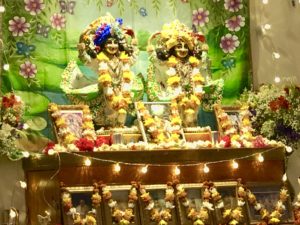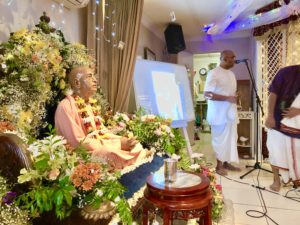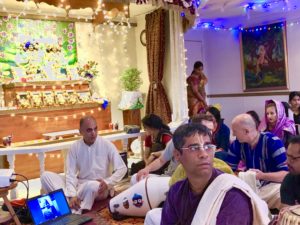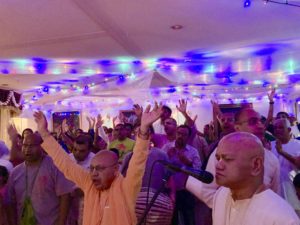
Written by Rukmini dd
The Vraj Parikrama is bursting at the seams this year. We are different. All 140 of us have come with a milieu of accents, skin tones, natures and cultures from all corners of the earth. Yet we have come to Vrindavan as family and Vrindavan is home.
We begin our pilgrimage in the early morning and load into three buses. Kadamba Kanana Maharaja smiles and chats to people in between managing logistics. He is a gracious host and guide on this sacred trail. Today we journey to Dhruva Tila in Madhuvan.
A five-year-old prince is insulted by the harsh words of his step mother who denounces him access to both his father’s lap and the kingdom. His heart, burning with the insult, festers with the need for revenge and he desires a kingdom greater than the material creation. He is told by his mother that only the Supreme Lord can fulfill such a desire and that He can be found in the forest. So he leaves home for the forests in search of Krsna.
Maharaja also chooses the bushy path towards Dhruva Tila, avoiding the noisy traffic, where our buses finally stop. Dhruva meets Narada, is given a process of sadhana and is sent to Madhuvan. We cross the soft sandy paths of Madhuvan leading to the temple honoring Dhruva, his guru – Narada; and Lord Narayana – who graced Dhruva with His darshan by the mercy of Narada.
Maharaja approaches the Dhruva lila with a fresh perspective. Narada instructs Dhruva to give up his enmity and be saintly. But Dhruva, deeply identifying as a ksatriya, sees the value of his instructions but could not embrace them in his heart. Narada then offers him a process of sadhana that would help achieve his goal yet purify him. However, Maharaja made the salient point that if Dhruva had embraced the transcendental instruction, he would have saved himself a lot of trouble. He made the distinction between following the orders of the spiritual master and wholeheartedly aligning ourselves with his mood.
This was a skillful link to the essence of his offering on Srila Prabhupada’s disappearance day. Lord Caitanya was surrounded by three circles when dancing at Ratha Yatra. The inner circle was his closest associates. So too was Srila Prabhupada. The outer circle is those who were touched by Prabhupada but may still be distracted. The inner circle is those who had complete focus on Srila Prabhupada’s desire. Denying the transcendental instruction placed Dhruva – and maybe us – on the outer circle. “You cannot get to the inner circle just by initiation,” Maharaja commented. We prayed at Dhruva Tila to align ourselves with the mood of the spiritual master with single-minded focus.
After a pleasant breakfast at the base of the temple, which was peaceful except for the occasional appearance of a maddened bull, we loaded the buses once more. Destination: Talavan. This is where Lord Balarama tackled a bunch of demon asses by spinning them unconscious and hurling them into huge Taal trees. A very original move, no?
We reach the temple of Lord Balarama with a smaller Krsna on his right and Revati on the left. Balarama is blackish. It is generally mentioned in this regard that Balarama had been so absorbed in the meditation in Krsna that he assumed the colour of Shyam. “That’s the way to chant,” Maharaja comments. We first head out for the roof in the stinging midday sun. “Some austerity is needed in the dhama,” said Maharaja. Some dust, heat, crowd and noise – the hooter of our bus is an extremely high pitched version of a horror movie soundtrack! But this is the price to be paid for the lap of Krsna, Vrndavana. But Maharaja, being merciful, soon led us to the shaded courtyard.
Maharaja has planned this parikrama as a meditation. It is no coincidence that we approach Lord Balarama on the first day. He represents the adi-guru and is the giver of spiritual strength. Maharaja makes the important connection that Lord Balarama’s very essence is service to Krsna. We pray to Him for such a service attitude because through service we experience joy. That joy is the crux of spiritual strength. That joy is a gift from Lord Balarama.
We head back to Krsna Balarama Mandir having planted prayers in sacred places. Precious seeds of instructions toss in our minds searching for our hearts.
The article " Vrndavana Braj Parikrama – Day 1 " was published on KKSBlog.





















 By Anuradha dasi
By Anuradha dasi 
 By Indradyumna Swami
By Indradyumna Swami



 By Iskcon Desire Tree
By Iskcon Desire Tree The devotees in Vrindavana held an excellent observance of Srila Prabhupada's disappearance day.
The devotees in Vrindavana held an excellent observance of Srila Prabhupada's disappearance day. 
